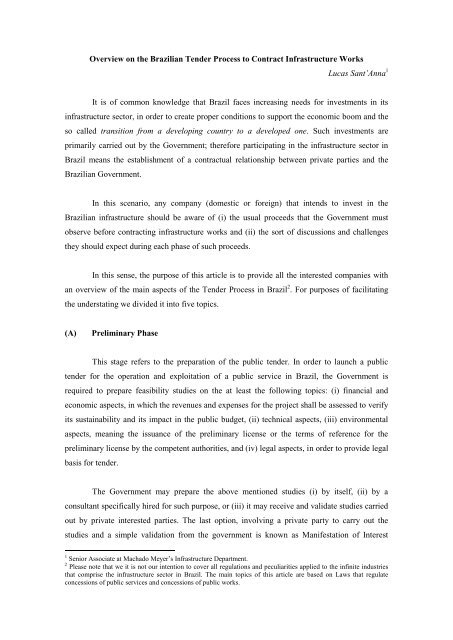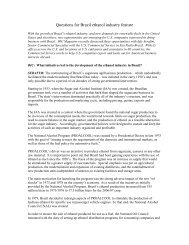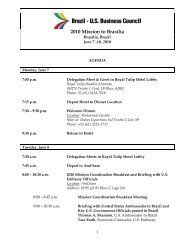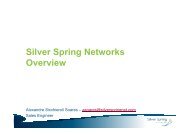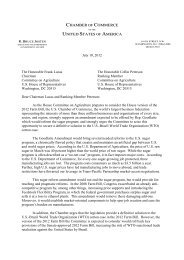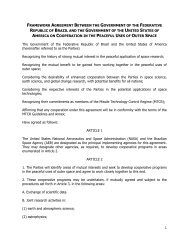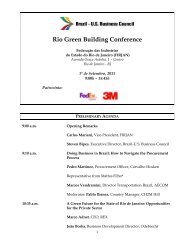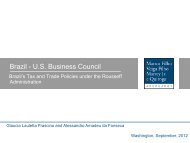Overview on the Brazilian Tender Process to Contract Infrastructure ...
Overview on the Brazilian Tender Process to Contract Infrastructure ...
Overview on the Brazilian Tender Process to Contract Infrastructure ...
You also want an ePaper? Increase the reach of your titles
YUMPU automatically turns print PDFs into web optimized ePapers that Google loves.
<str<strong>on</strong>g>Overview</str<strong>on</strong>g> <strong>on</strong> <strong>the</strong> <strong>Brazilian</strong> <strong>Tender</strong> <strong>Process</strong> <strong>to</strong> C<strong>on</strong>tract <strong>Infrastructure</strong> WorksLucas Sant’Anna 1It is of comm<strong>on</strong> knowledge that Brazil faces increasing needs for investments in itsinfrastructure sec<strong>to</strong>r, in order <strong>to</strong> create proper c<strong>on</strong>diti<strong>on</strong>s <strong>to</strong> support <strong>the</strong> ec<strong>on</strong>omic boom and <strong>the</strong>so called transiti<strong>on</strong> from a developing country <strong>to</strong> a developed <strong>on</strong>e. Such investments areprimarily carried out by <strong>the</strong> Government; <strong>the</strong>refore participating in <strong>the</strong> infrastructure sec<strong>to</strong>r inBrazil means <strong>the</strong> establishment of a c<strong>on</strong>tractual relati<strong>on</strong>ship between private parties and <strong>the</strong><strong>Brazilian</strong> Government.In this scenario, any company (domestic or foreign) that intends <strong>to</strong> invest in <strong>the</strong><strong>Brazilian</strong> infrastructure should be aware of (i) <strong>the</strong> usual proceeds that <strong>the</strong> Government mus<strong>to</strong>bserve before c<strong>on</strong>tracting infrastructure works and (ii) <strong>the</strong> sort of discussi<strong>on</strong>s and challenges<strong>the</strong>y should expect during each phase of such proceeds.In this sense, <strong>the</strong> purpose of this article is <strong>to</strong> provide all <strong>the</strong> interested companies withan overview of <strong>the</strong> main aspects of <strong>the</strong> <strong>Tender</strong> <strong>Process</strong> in Brazil 2 . For purposes of facilitating<strong>the</strong> understating we divided it in<strong>to</strong> five <strong>to</strong>pics.(A)Preliminary PhaseThis stage refers <strong>to</strong> <strong>the</strong> preparati<strong>on</strong> of <strong>the</strong> public tender. In order <strong>to</strong> launch a publictender for <strong>the</strong> operati<strong>on</strong> and exploitati<strong>on</strong> of a public service in Brazil, <strong>the</strong> Government isrequired <strong>to</strong> prepare feasibility studies <strong>on</strong> <strong>the</strong> at least <strong>the</strong> following <strong>to</strong>pics: (i) financial andec<strong>on</strong>omic aspects, in which <strong>the</strong> revenues and expenses for <strong>the</strong> project shall be assessed <strong>to</strong> verifyits sustainability and its impact in <strong>the</strong> public budget, (ii) technical aspects, (iii) envir<strong>on</strong>mentalaspects, meaning <strong>the</strong> issuance of <strong>the</strong> preliminary license or <strong>the</strong> terms of reference for <strong>the</strong>preliminary license by <strong>the</strong> competent authorities, and (iv) legal aspects, in order <strong>to</strong> provide legalbasis for tender.The Government may prepare <strong>the</strong> above menti<strong>on</strong>ed studies (i) by itself, (ii) by ac<strong>on</strong>sultant specifically hired for such purpose, or (iii) it may receive and validate studies carriedout by private interested parties. The last opti<strong>on</strong>, involving a private party <strong>to</strong> carry out <strong>the</strong>studies and a simple validati<strong>on</strong> from <strong>the</strong> government is known as Manifestati<strong>on</strong> of Interest1 Senior Associate at Machado Meyer’s <strong>Infrastructure</strong> Department.2 Please note that we it is not our intenti<strong>on</strong> <strong>to</strong> cover all regulati<strong>on</strong>s and peculiarities applied <strong>to</strong> <strong>the</strong> infinite industriesthat comprise <strong>the</strong> infrastructure sec<strong>to</strong>r in Brazil. The main <strong>to</strong>pics of this article are based <strong>on</strong> Laws that regulatec<strong>on</strong>cessi<strong>on</strong>s of public services and c<strong>on</strong>cessi<strong>on</strong>s of public works.
<strong>Process</strong> (<strong>Process</strong>o de Manifestação de Interesse or “PMI”). The legal basis for this kind ofpreliminary studies is provided by Article 21, of Law 8.987/95 (“C<strong>on</strong>cessi<strong>on</strong> Law”) – meaningthat it applies <strong>on</strong>ly <strong>to</strong> projects that involve c<strong>on</strong>cessi<strong>on</strong>s of public services or c<strong>on</strong>cessi<strong>on</strong>s ofpublic works.Never<strong>the</strong>less <strong>the</strong> Government has <strong>to</strong> observe manda<strong>to</strong>ry procedures in order <strong>to</strong> advance<strong>to</strong> phase I. In such regard, whenever <strong>the</strong> projected value for <strong>the</strong> c<strong>on</strong>cessi<strong>on</strong> agreement reachesan amount higher than R$150,000,000.00 (<strong>on</strong>e hundred and fifty milli<strong>on</strong> reais) a public hearingshall be set up by <strong>the</strong> Government. In <strong>the</strong> public hearing <strong>the</strong> interested parties shall have access<strong>to</strong> <strong>the</strong> informati<strong>on</strong> regarding <strong>the</strong> tender and shall have <strong>the</strong> right <strong>to</strong> dem<strong>on</strong>strate <strong>the</strong>ir opini<strong>on</strong>s.The public hearing shall occur 15 (fifteen) business days prior <strong>to</strong> <strong>the</strong> launching of <strong>the</strong> Requestfor Proposal (“RFP”, that includes <strong>the</strong> <strong>Tender</strong> Document – Edital - and <strong>the</strong> C<strong>on</strong>cessi<strong>on</strong>Agreement).Also, whenever <strong>the</strong> c<strong>on</strong>tractual arrangement is a PPP, <strong>the</strong> Government shall publish <strong>the</strong>draft of <strong>the</strong> RFP for a public c<strong>on</strong>sultati<strong>on</strong> that shall take at least 30 (thirty) days.For ease of reference, <strong>the</strong> legal basis that describes <strong>the</strong> present phase area, am<strong>on</strong>g o<strong>the</strong>rsalready menti<strong>on</strong>ed above, Article 10, of Law 11.079/04 (“PPP Law”), and article 39, of Law8.666/93 (“Public Biddings Law”).(B)Phase IPhase I comprises <strong>the</strong> steps from <strong>the</strong> launching of <strong>the</strong> RFP <strong>to</strong> <strong>the</strong> date set for <strong>the</strong> aucti<strong>on</strong>itself. The entire period takes at least 30 (thirty) days. The RFP shall specify all requireddocuments for qualificati<strong>on</strong>, including whe<strong>the</strong>r <strong>the</strong> parties may participate in a c<strong>on</strong>sortiumformat. Also, <strong>the</strong> RFP shall indicate whe<strong>the</strong>r a technical proposal is required and its weight incomparis<strong>on</strong> <strong>to</strong> <strong>the</strong> required financial proposal.In this sense, during such phase <strong>the</strong> interested parties shall: (i) review <strong>the</strong> RFP andprepare <strong>the</strong> documents required for qualificati<strong>on</strong>, (ii) enter in<strong>to</strong> corporate arrangements witho<strong>the</strong>r parties (e.g Memoranda of Understandings), in order <strong>to</strong> organize <strong>the</strong>mselves as aC<strong>on</strong>sortium, if necessary and interesting <strong>to</strong> <strong>the</strong> parties, (iii) prepare <strong>the</strong> financial, ec<strong>on</strong>omicproposal, and <strong>the</strong> technical proposal, if required.The parties have <strong>the</strong> right <strong>to</strong> prepare questi<strong>on</strong>s and <strong>to</strong> have <strong>the</strong> questi<strong>on</strong>s answered by<strong>the</strong> Government. Although <strong>Brazilian</strong> Laws do not specify a specific deadline for addressing
questi<strong>on</strong>s, <strong>the</strong> RFP usually sets a date that varies from 10 (ten) <strong>to</strong> 5 (five) days before <strong>the</strong> dateset for <strong>the</strong> Aucti<strong>on</strong>.On <strong>the</strong> o<strong>the</strong>r hand, <strong>the</strong> Public Biddings Law provides that any citizen and any biddershall have <strong>the</strong> right <strong>to</strong> appeal from illegal provisi<strong>on</strong>s in <strong>the</strong> RFP. The first shall present hisappeal up <strong>to</strong> 5 (five) business days before <strong>the</strong> date set for <strong>the</strong> aucti<strong>on</strong> meanwhile <strong>the</strong> biddershall present his appeal up <strong>to</strong> 2 (two) business days before <strong>the</strong> date set for <strong>the</strong> aucti<strong>on</strong>. Thepresentati<strong>on</strong> of appeals nei<strong>the</strong>r precludes <strong>the</strong> bidders <strong>to</strong> participate in <strong>the</strong> aucti<strong>on</strong> nor s<strong>to</strong>ps <strong>the</strong>regular course of tender process, unless <strong>the</strong> Government decides <strong>to</strong> accept <strong>the</strong> appeal.For ease of reference, <strong>the</strong> legal basis that describes <strong>the</strong> present phase area, am<strong>on</strong>go<strong>the</strong>rs, Article 40, Secti<strong>on</strong>s I <strong>to</strong> XVII, and 41, Paragraph 1 st , of <strong>the</strong> Public Biddings Law, andArticle 19, secti<strong>on</strong>s I <strong>to</strong> IV, of <strong>the</strong> C<strong>on</strong>cessi<strong>on</strong>s Law.(C)Phase IIPhase II comprises <strong>the</strong> moment in which <strong>the</strong> bidders submit both qualificati<strong>on</strong>documents and proposals (ec<strong>on</strong>omic and/or technical) for <strong>the</strong> awarding of <strong>the</strong> c<strong>on</strong>tract <strong>to</strong> <strong>the</strong>winner bidder. There are two possible procedural arrangements for this phase: (i) regular courseand (ii) reverse course.In <strong>the</strong> regular course, <strong>the</strong> Government opens <strong>the</strong> qualificati<strong>on</strong> documents of all biddersand qualifies or disqualifies all or some of <strong>the</strong> bidders. Then <strong>the</strong> Government gives <strong>the</strong>opportunity <strong>to</strong> <strong>the</strong> bidders <strong>to</strong> analyze and identify flaws in <strong>the</strong> documents presented by <strong>the</strong>ircompeti<strong>to</strong>rs. The identified flaws will give reas<strong>on</strong> <strong>to</strong> appeals <strong>to</strong> be presented in 5 (five) businessdays. The bidders attacked by <strong>the</strong>ir competi<strong>to</strong>rs may counter-appeal in 5 (five) business days.Then, <strong>the</strong> Government decides <strong>on</strong> <strong>the</strong> appeals. Only <strong>the</strong> qualified bidders will have <strong>the</strong>irfinancial and technical proposals opened. As <strong>on</strong>e may notice, <strong>the</strong> regular course brings <strong>to</strong> <strong>the</strong>tender process a wide open field <strong>to</strong> litigati<strong>on</strong>. Such litigati<strong>on</strong> may even shift from <strong>the</strong> field of <strong>the</strong>tender process (administrative process) <strong>to</strong> <strong>the</strong> judiciary, since in Brazil, by a c<strong>on</strong>stituti<strong>on</strong>alprinciple, all decisi<strong>on</strong>s may be reviewed by <strong>the</strong> courts.In <strong>the</strong> reverse course, <strong>the</strong> Government firstly opens <strong>the</strong> financial proposals. Then <strong>the</strong>bidders are classified in accordance <strong>to</strong> <strong>the</strong> benefits presented <strong>to</strong> <strong>the</strong> Government. Only <strong>the</strong>bidder that presented <strong>the</strong> best offer shall have its qualificati<strong>on</strong> documents opened and analyzedby <strong>the</strong> Government and <strong>the</strong> o<strong>the</strong>r bidders. O<strong>the</strong>r bidders have <strong>the</strong> right <strong>to</strong> appeal against <strong>the</strong>qualificati<strong>on</strong> documents presented by <strong>the</strong> best classified bidder, in 5 (five) business days. After
that, <strong>the</strong> Government shall decide whe<strong>the</strong>r <strong>the</strong> bidder best classified shall be awarded with <strong>the</strong>c<strong>on</strong>tract or <strong>the</strong> documents presented by <strong>the</strong> sec<strong>on</strong>d best classified bidder shall be opened, whichmeans <strong>the</strong> disqualificati<strong>on</strong> of <strong>the</strong> first best classified. In reverse course tender processes, <strong>the</strong>litigati<strong>on</strong> tends <strong>to</strong> be reduced, expediting <strong>the</strong> decisi<strong>on</strong>s and awarding of <strong>the</strong> c<strong>on</strong>tract. Publictenders for PPPs C<strong>on</strong>tracts usually follow <strong>the</strong> reverse course method.For ease of reference, <strong>the</strong> legal basis that describes <strong>the</strong> present phase area, am<strong>on</strong>go<strong>the</strong>rs, Article 13, of PPP Law, Article 43, of Law Public Biddings Law, and Article 18-A,Secti<strong>on</strong>s I <strong>to</strong> IV, of <strong>the</strong> C<strong>on</strong>cessi<strong>on</strong>s Law.(D)Phase IIIAfter <strong>the</strong> final awarding of <strong>the</strong> c<strong>on</strong>tract, <strong>the</strong> awarded bidder usually has around 30(thirty) <strong>to</strong> 45 (forty five) days <strong>to</strong> incorporate a Special Purpose Company (“SPC”) and <strong>to</strong> presentguarantees and insurances in order <strong>to</strong> finally execute <strong>the</strong> C<strong>on</strong>tract 3 . Therefore, phase III c<strong>on</strong>tainsa great number of legal steps that <strong>the</strong> awarded bidder shall comply with <strong>to</strong> be ready <strong>to</strong> <strong>the</strong>executi<strong>on</strong> of <strong>the</strong> C<strong>on</strong>tract.In case <strong>the</strong> awarded bidder is organized under a c<strong>on</strong>sortium format, we can anticipatediscussi<strong>on</strong>s not <strong>on</strong>ly in c<strong>on</strong>necti<strong>on</strong> with <strong>the</strong> drafting of <strong>the</strong> By Laws and <strong>the</strong> Articles ofIncorporati<strong>on</strong> of <strong>the</strong> SPC but also shareholders agreement <strong>to</strong> sort obligati<strong>on</strong>s and liabilitiesam<strong>on</strong>g <strong>the</strong> shareholders of <strong>the</strong> SPC. Also, <strong>the</strong> c<strong>on</strong>tracting of insurances and guarantees (e.g.performance b<strong>on</strong>d) may give reas<strong>on</strong> <strong>to</strong> <strong>the</strong> draft of legal documents, such as counter-guaranteesagreements.It is worth notice that usually RFPs require a minimum capital s<strong>to</strong>ck <strong>to</strong> be paid in by <strong>the</strong>SPC before <strong>the</strong> executi<strong>on</strong> of <strong>the</strong> C<strong>on</strong>tract.In this phase, discussi<strong>on</strong>s <strong>on</strong> <strong>the</strong> financing terms shall take place during this phase. Inthis sense, <strong>the</strong> corporate documents shall be designed envisi<strong>on</strong>ing <strong>the</strong> future loan agreements <strong>to</strong>be executed by and between <strong>the</strong> SPC and <strong>the</strong> Lenders.3 Please note that <strong>the</strong> need for <strong>the</strong> incorporati<strong>on</strong> of a SPC varies according <strong>to</strong> <strong>the</strong> purpose of <strong>the</strong> GovernmentC<strong>on</strong>tract. For simple public works (without <strong>the</strong> provisi<strong>on</strong> of services within <strong>the</strong> c<strong>on</strong>tract) <strong>the</strong> Government seeks <strong>to</strong>c<strong>on</strong>tract with <strong>the</strong> bidders <strong>the</strong>mselves (not a specific vehicle).
For ease of reference, <strong>the</strong> legal basis that describes <strong>the</strong> present phase area, am<strong>on</strong>go<strong>the</strong>rs, Article 9, of <strong>the</strong> PPP Law, Article 19, paragraph 1 st , and Article 20, of <strong>the</strong> C<strong>on</strong>cessi<strong>on</strong>sLaw.(E)Phase IVPhase IV refers <strong>to</strong> <strong>the</strong> proper executi<strong>on</strong> of <strong>the</strong> C<strong>on</strong>tract and <strong>the</strong> performance of <strong>the</strong>services. The discussi<strong>on</strong>s <strong>on</strong> level of services and performance shall give <strong>the</strong> line of <strong>the</strong>relati<strong>on</strong>ship with <strong>the</strong> Government. Possible claims of ec<strong>on</strong>omic equilibrium shall also take placeduring this phase.(F) C<strong>on</strong>clusi<strong>on</strong>After going through <strong>the</strong> main aspects of <strong>the</strong> process for c<strong>on</strong>tracting infrastructure worksby <strong>the</strong> Government in Brazil, it is important <strong>to</strong> keep in mind that in all phases <strong>the</strong> lawguarantees publicity and many chances of participati<strong>on</strong> for all interested parties. In this sense,any inves<strong>to</strong>r currently pursuing opportunities in <strong>the</strong> infrastructure sec<strong>to</strong>r in Brazil should lookfor means of getting aware of public tenders. Also, inves<strong>to</strong>rs should try <strong>to</strong> achieve a betterunderstanding of all rights and risks involving Government c<strong>on</strong>tracts and most of <strong>the</strong>m arerelated <strong>to</strong> <strong>the</strong> manda<strong>to</strong>ry tender process involved.


